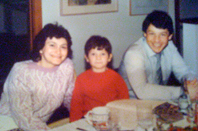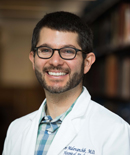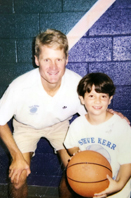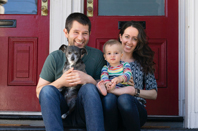Interview with Lev Malevanchik
A Conversation with Lev Malevanchik, Assistant Clinical Professor
Where did you grow up? Tell us a little about your family.
I have a small, loving family. My parents, grandparents, and I immigrated from Moscow, Russia in 1990 to the US to escape communism, and ended up in Tucson, Arizona, the polar opposite. They now live in San Diego, California, and it's been hard not seeing them during COVID. We still do lots of FaceTime, and I've maintained my Russian,although my grammar isn't perfect! I'm also speaking Russian exclusively with my 15-month-old toddler, which is a treat. In my family, I  hope I am most like my mom, who is smart, dedicated, kind, and generous. I met my wife in college at Berkeley, and we've been together for 14 years now. She is a nonprofit environmental lawyer, fighting to protect our air, water,food, and environment from pollution.
hope I am most like my mom, who is smart, dedicated, kind, and generous. I met my wife in college at Berkeley, and we've been together for 14 years now. She is a nonprofit environmental lawyer, fighting to protect our air, water,food, and environment from pollution.

As a child, what did you want to be when you grew up? What was your favorite thing to do as a kid?
I very clearly wanted to be an NBA basketball player. I went to basketball camp every summer, including Steve Kerr basketb all camp (he was a famous player in the 1980s for the University of Arizona in Tucson). I remember how I would walk around the house "air dribbling" the ball between my legs and putting up jump shots through imaginary hoops. As a kid, I played all of the sports, and I loved team sports the most. But I also played on the chess team in elementary school and high school. I never got as good as my grandparents, but I did beat my dad at chess.
all camp (he was a famous player in the 1980s for the University of Arizona in Tucson). I remember how I would walk around the house "air dribbling" the ball between my legs and putting up jump shots through imaginary hoops. As a kid, I played all of the sports, and I loved team sports the most. But I also played on the chess team in elementary school and high school. I never got as good as my grandparents, but I did beat my dad at chess.
What book or movie had a big influence on you? What books would you recommend reading?
Devil in the Grove by Gilbert King and Killers of the Flower Moon by David Grann are two stories about who holds power in America that were illuminating to me. My favorite movies are "My Cousin Vinny" and "Pulp Fiction."
What's the hardest lesson you've learned in your current role [at the time of this interview, he was a fellow]?
The hardest lesson I learned during my fellowship was probably patience. Patience is so important for culture change. It's very easy to see a problem, instantly think of a solution, and ask for immediate implementation. But I think the way to make real change is to spend time understanding the problem you're trying to solve, by reading or collaborating with stakeholders. I do think the QI framework is quite useful. For our project to improve communication with patients with limited English proficiency (LEP), we started by learning that patients with LEP face barriers and worse outcomes. One of the reasons is poor communication. From there, we did surveys to figure out the root cause, and we eventually decided to improve access to video interpretation. However, getting more video interpreters in the hospital took months, really the entirety of my fellowship. But I'm glad we did it because people are beginning to recognize the benefit of speaking with their patients each time with an interpreter.
As healthcare workers with long hours, sometimes it's hard to keep a good balance between work and home life. How do you separate these and what advice would you give?
Although my job as a hospitalist requires work on the weekend, evenings, and nights occasionally, it's very important to me to maintain normal business hours when I'm not clinical. Unless it's urgent, I generally don't read or respond to email in the evenings or on the weekends. I've also removed email alerts from my phone. Given how easy it is to always be on and check email, it requires conscious effort not to do that. I hope my colleagues appreciate not receiving emails on the weekend from me, as there is rarely something so important that it can't be handled on Monday morning. This also allows me to spend quality time with my family and friends because I am able to focus my attention.
What is something you're looking forward to in the next 5 years?
 I am incredibly excited to see my young son grow up. He's now 15 months old—standing, eating on his own, sharing his opinions, and enjoying his books and toys. I look forward to being able to play sports with him, ride a bike with him, and teach him about the world. Having a child is like learning a new language—you suddenly understand so much about the world that you knew nothing about before. I feel a shared bond with all parents now. But it also means life is changing constantly. I am looking forward to the adventure.
I am incredibly excited to see my young son grow up. He's now 15 months old—standing, eating on his own, sharing his opinions, and enjoying his books and toys. I look forward to being able to play sports with him, ride a bike with him, and teach him about the world. Having a child is like learning a new language—you suddenly understand so much about the world that you knew nothing about before. I feel a shared bond with all parents now. But it also means life is changing constantly. I am looking forward to the adventure.
- by Lena Loo
View Lev' professional bio | Go back to interviews
